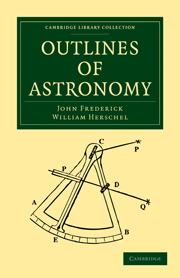CHAPTER XII
Published online by Cambridge University Press: 05 July 2011
Summary
(602.) In the progress of this work, we have more than once called the reader's attention to the existence of inequalities in the lunar and planetary motions not included in the expression of Kepler's laws, but in some sort supplementary to them, and of an order so far subordinate to those leading features of the celestial movements, as to require, for their detection, nicer observations, and longer-continued comparison between facts and theories, than suffice for the establishment and verification of the elliptic theory. These inequalities are known, in physical astronomy, by the name of perturbations. They arise, in the case of the primary planets, from the mutual gravitations of these planets towards each other, which derange their elliptic motions round the sun; and in that of the secondaries, partly from the mutual gravitation of the secondaries of the same system similarly deranging their elliptic motions round their common primary, and partly from the unequal attraction of the sun and planets on them and on their primary. These perturbations, although small, and, in most instances, insensible in short intervals of time, yet, when accumulated, as some of them may become, in the lapse of ages, alter very greatly the original elliptic relations, so as to render the same elements of the planetary orbits, which at one epoch represented perfectly well their movements, inadequate and unsatisfactory after long intervals of time.
- Type
- Chapter
- Information
- Outlines of Astronomy , pp. 378 - 412Publisher: Cambridge University PressPrint publication year: 2010First published in: 1864



